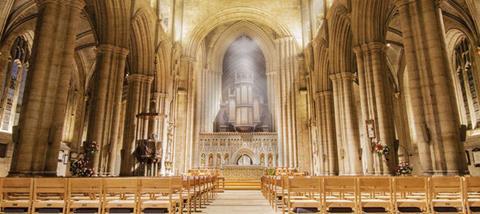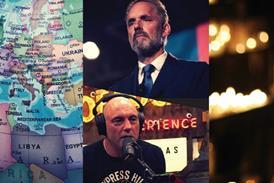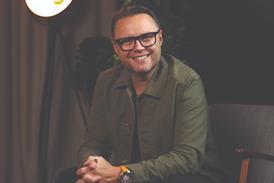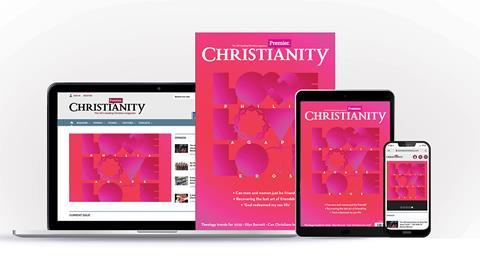
What do Liverpool St Station, the River Cam and an Anglo-Saxon crypt in Yorkshire have in common? The answer is that they’re all considered “holy” by prominent religious figures and feature in the third series of my programme, Holy Places, on Premier Christian Radio.
In order to produce the new series, I have taken enriching journeys with six well-known people to their holy places. As we’ve travelled, I have spoken with them about their life’s journey and discussed the meaning of holiness.
During the first series I went with the Cardinal Archbishop of Westminster to Sir Thomas More’s cell in the Tower of London (not normally open to the public), where the former Lord Chancellor spent his final months before being executed at the command of Henry VIII. As I stood in that cold, damp, dark cell it was impossible not to shiver, and when the cardinal read More’s last letter to his beloved daughter, written in charcoal the night before his death, it was almost impossible to hold back the tears.
The holy place that most affected me during this new series was the Anglo-Saxon crypt in Ripon Cathedral. It was the choice of Bishop Nick Baines, an ex-spy from GCHQ. (I of course tried to get him to talk about that, but it turns out he’s signed the Official Secrets Act!) To reach the seventh-century crypt you have to descend into a dark stone passage. The walls press up against you, and the ceiling gets progressively lower as you move through what seems like a maze before reaching the small, candle-lit altar.
It was easy to imagine Christians huddling there in fear and desperation as the Vikings began to burn the building above them. I was again moved to tears. I know as you get older you become more prone to weeping, but I defy anyone to remain unaffected by this special place.
But what makes it, and the other places we visit, holy? Is it what happened in them? Is it related to those who lived and died there? Is it because it’s easier to feel closer to God in these places?
YOU HAVE A SENSE IN THIS CATHEDRAL OF GENERATIONS WORSHIPPING
It cannot be that we are actually closer to God in these places, for God is always with us. And yet for me, my holy places are where I feel closer to God, or at least where I feel most keenly that I am in his presence.
Making these programmes has had a profound effect on me. It was a privilege to have so many fascinating people speak so frankly to me about their inner thoughts. I do hope you enjoy the following extracts and the full interviews on Premier Christian Radio.
CAROLINE WYATT
Former religious correspondent for the BBC
Westminster Cathedral, London
This is the first church I ever remember visiting. It was with my mum when I was 3 years old. Even at that age I remember being fascinated by the building. It was the most exquisite and remarkable place I can remember seeing.
I told my parents I wanted to be the first female pope. They very kindly explained to me this was not remotely a possibility because the pope could not be a woman. I said, “If I can’t do that I’d quite like to be queen, so I shall marry Prince Charles.” They said, “We’re terribly sorry, but you can’t do that either because you’re Catholic and it’s not allowed.” So in the end I joined the BBC instead!
When I first started at the BBC I had conversations with colleagues where they’d say odd things like, “My mother wouldn’t like me being friends with a Catholic.” I found that absolutely baffling because this was the early 1990s and I couldn’t see why anyone would feel it mattered so much. I think generally Christians of all kinds are now beginning to be more united as they realise the things that separated us for so long don’t really matter so much. Fundamentally, you do believe in the same things.
A lot of my absolutely happiest memories are of coming here, sitting at Mass, hearing my mother speak the words of the Creed and absorbing what it meant to worship. You have a sense in this cathedral of generations worshipping. You can feel it. As a child, I didn’t know what many of the words meant, but you could look up and have all these visual reminders.
HOLINESS ISN’T ABOUT BEING SET APART. IT’S ABOUT ENGAGING
I’ve had battles and struggles with faith. I’ve gone away from it. I’ve had periods where I’ve thought the things we’re seeing and filming were so horrific that I couldn’t believe a benevolent God would allow them to happen. I thought we had been abandoned. I still have doubts and I still struggle, but I have come back to the faith.
When I come in here, and I do about once a week and quite often light candles and say a prayer, it means a lot to me. It brings enormous comfort. It’s somewhere I feel very close to my mother, who died in 1978 when I was ten. I feel closer to God here than probably anywhere else.
NICK BAINES
Bishop of Leeds
St Wilfred’s Crypt in Ripon Cathedral, North Yorkshire
St Wilfred’s Crypt is the oldest stone-built place of worship in the country. The stones we’re touching here have been there since 671. They were built by real people who loved God, knew they were loved by God and wanted the world to know that.
I find it very powerful that this place has been prayed in and the story kept alive for all those centuries. This is where the story began for Christianity in England. It’s easy to romanticise these epic stories of the saints, but it was real. Life was brutal and short for many people. Faith was about loving God and being obedient to God, rather than getting a comfortable life for yourself.
This building has stood through two world wars, the Reformation, counter-Reformation, plagues and the invasions of 1,000 years ago.
There’s a story that the bones of St Cuthbert were kept here. There was an idea that’s still alive now that you were somehow close to holiness if you were close to the remains of these famous people. Some people don’t understand it and think they’re just bones. But it’s about being close to the person and what they represented.
The incarnation – God coming among us and opting in to all that the world is – means that instead of being worried about being contaminated by the world, we’re concerned with contaminating the world with grace, mercy, justice and generosity and the love of God. So holiness for me isn’t about being set apart. It’s about engaging.
ROBERT BECKFORD
Broadcaster and academic
Church of St Barnabas, Coventry
I’m a spirituality shopper in terms of my personal experience. I was baptised within the Pentecostal Church in water. Then I had a baptism of the Spirit where I spoke in tongues. I like the supernatural side of Christianity. But there’s also my academic side, which takes me in a slightly different direction.
We have to question the faith we have but also recognise there are limitations to the questioning, and ultimately the Bible is a book of faith and you have to believe. I hold those two things in tension, whether I’m in church or the academy. I can be in church and be thinking critically. I can be teaching and feel I’m having a spiritual moment and what I’m saying is the Spirit of God speaking through me.
I think we make things holy by elevating things and giving them a special place in our lives. The Church provides me with a powerful sense of transcendence; seeing there’s something bigger than me and bigger than my world.
St Barnabas is where my faith was forged. The routine of going to church, hearing the preacher, singing the songs, hearing the testimony of the saints of God; all that grounded me in a tradition of worship and of faith that helped shape my whole life. It provides me with a sense of otherness: that there’s something greater and more powerful than myself and this world.
Caroline Wyatt
Former religious correspondent for the BBC
Westminster Cathedral, London
Nick Baines
Bishop of Leeds
St Wilfred’s Crypt in Ripon Cathedral, North Yorkshire
Robert Beckford
Broadcaster and academic
Church of St Barnabas, Coventry
Lucy Winkett
Rector of St James' Church, Piccadilly, and former minor canon at St Paul’s Cathedral
St Paul’s Cathedral
LUCY WINKETT
Rector of St James' Church, Piccadilly, and former minor canon at St Paul’s Cathedral
St Paul’s Cathedral
Having worked in two [Christopher] Wren churches, I’ve realised his vision: of a place that was sacred in itself, but had clear glass where as you worship you can see the number 25 bus going past, and it melts the divide between the sacred and the secular in a very helpful way. From time to time, of course, we withdraw from the hurly-burly outside to pray and find silence. At the same time the glass is clear. We want to be a church without walls and where there’s movement between those two worlds.
Holy is not necessary being quiet in a corner and separate. Holy is also looking at a budget, treating your staff well, understanding what it means to maintain [St Paul’s] as a place where people are invited to pray. It also refuses the dividing line between sacred and secular. My definition of holy is very broad and wide and includes a lot of mess,
paradox and difficult conversations.
Rather than defining what is holy, I would express it in the sense that the home of all activity and noise is silence and prayer. If you know where your home is, you’re able to travel. I think that makes sense of “we’re in the world and not of the world”.
Holiness is not a place to me. It’s an attitude of mind or a habit of my heart. That has to be cultivated day after day: making mistakes, getting stuff wrong, crossing boundaries we shouldn’t cross. That adventurousness is a way of life that I think will help remind us what is ultimately holy.
ROGER BOLTON presents the Feedback programme on BBC Radio 4 and Holy Places on Premier Christian Radio premierchristianradio.com/holyplaces
To hear the full interviews, listen to Holy Places on Sundays at 7pm during September and October



























